Data Privacy Brasil’s contribution to the Thematic Deep Dive of Artificial Intelligence and other Emerging Technologies of the Global Digital Compact
As other civil society organizations already pointed out, notable preference was given to the speech of Member States, UN agencies, and the private sector, at the expense of human rights civil society organizations, which prevented the speech that had been prepared by the DBPR and other civil society stakeholders.
In september 2020, the United Nations’ Secretary-General released the report “Our Common Agenda“, in which it proposes a Global Digital Compact (GDC) to be agreed at the Summit of the Future in September 2024 through a technology track involving all stakeholders: governments, the United Nations system, the private sector (including tech companies), civil society, grass-roots organizations, academia, and individuals, including youth. The GDC main goal is to “outline shared principles for an open, free and secure digital future for all“.
In this scenario, the President of the UN General Assembly appointed the Permanent Representatives of Rwanda and of Sweden as Co-facilitators to lead informal consultations with Member States and Stakeholders. These consultations (including remote participation) initiated in January 2023 and will last until June 2023. The process was separated in thematic deep-dives.
Data Privacy Brazil Research Association (DPBR) is part of the Southern Alliance for the Global Digital Compact, which comprises civil society organizations from Bolivia, India, Kenya and other African countries, as well as Brazil. We welcome this important process and have already participated in the themes of internet governance and data protection.
Last Thursday, May 25, the deep dive of Artificial Intelligence and other emerging technologies took place, but even though we registered and prepared a speech, we didn’t have the chance to express our points at the meeting. As other civil society organizations already pointed out, notable preference was given to the speech of Member States, UN agencies, and the private sector, at the expense of human rights civil society organizations, which prevented the speech that had been prepared by the DBPR and other civil society stakeholders.
With the aim of encouraging transparent and meaningful multistakeholder participation, the DPBR now publishes what would be its oral participation:
“Data Privacy Brasil’s contribution to the Thematic Deep Dive of Artificial Intelligence and other Emerging Technologies of the Global Digital Compact
United Nations, New York
May 25th, 2023
Dear co-facilitators and others present at this consultation. My name is Paula Guedes, I am a researcher at Data Privacy Brazil Research Association, and we are part of the Southern Alliance for the Global Digital Compact, which comprises civil society organizations from Bolivia, India, Kenya and other African countries, as well as Brazil. We are pleased to be part of this important process.
The Southern Alliance published its contribution for the Global Digital Compact in which we mention a list of core principles for AI regulation and key commitments, pledges and actions that may be done by important stakeholders. I will try to address some of them in my speech today.
In recent years, we have seen an explosion of ethical guides and principles being created, but without the necessary cogent force for their application in practice. Therefore, today we are talking about the need to transform ethical principles into effective practices by regulated agents, in order to enable a change in behavior that protects fundamental rights within the scope of AI. We are talking about binding regulation, which enforcement would be supervised by competent authorities, but through a responsive regulation framework, with participation of different stakeholders, not being monopolized by states.
In order to convert principles into practice, it is essential that the regulation provides governance instruments that are inspected and supervised by a competent authority with sanctioning powers. One of the outstanding instruments is the algorithmic impact assessment prior to the use of AI systems and with meaningful public participation and due public scrutiny.
We need to overcome the idea of false tradeoffs that regulation would impede technological development, but think that regulation can serve as fuel for a more responsible technology that protects rights. In this sense, with the main goal to protect human rights, while promoting the technological development, the regulation should harmonize the risk-based and rights-based approach, in a way that AI systems are subject to more or less obligations and duties according to the level of risk, which means, that the regulatory intervention should be proportionate to the level of risk. Theremore, the greater the risk level, more obligations for the AI systems, corresponding to more rights to the individuals. In this sense, through a precautionary approach, AI regulation should also establish uses of AI that are so harmful to fundamental rights that must be previously prohibited, as is the case of social scoring systems and facial recognition for public safety purposes.
It is crucial to have truly global awareness of the asymmetries between countries of the Global North and Global South and promote global best practices in AI to reduce these disparities, especially in terms of data collection and processing. At this point, regulation must consider the context in which it is applied, always taking into account the prohibition of unfair discrimination against individuals or groups, especially the already marginalized and vulnerable population.
Thank you!”
Veja também
-
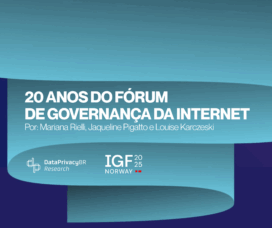
20 anos do Fórum de Governança da Internet
Entre os dias 23 e 27 de junho, a Data Privacy Brasil esteve presente na vigésima edição do Fórum de Governança da Internet global - IGF, que aconteceu na cidade de Lillestrom, na Noruega. O Fórum tem sido o principal lugar de discussão sobre uso e desenvolvimento da Internet, destacando-se pelo formato multissetorial (multistakeholder).
-

Relatório | Identidade Digital e Infraestrutura Pública Digital: recomendações para uma arquitetura informacional justa
A Data Privacy Brasil lança seu novo relatório intitulado “Identidade Digital e Infraestrutura Pública Digital: recomendações para uma arquitetura informacional justa”. O estudo examina o impacto de uma Infraestrutura Pública Digital (IPD), especialmente as aplicações de identidade digital, para a proteção de dados pessoais à luz da Constituição Federal brasileira (CF) e da Lei Geral de Proteção de Dados (LGPD).
-

Data Privacy Brasil contribui para formulação de evento de alto nível da Cúpula Mundial para a Sociedade da Informação
O evento, que é co-organizado pela UIT, UNESCO, PNUD, e UNCTAD, acontece em julho, e neste mês de março os stakeholders puderam enviar suas sugestões acerca do formato e do conteúdo a ser debatido, em especial à luz do processo de revisão.
-
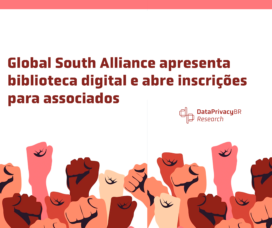
Global South Alliance apresenta biblioteca digital e abre inscrições para associados
Para fortalecer ainda mais a Aliança, a GSA convida organizações a expressarem seu interesse em ingressar na rede preenchendo o formulário de inscrição disponível até 24 de abril de 2025.
-
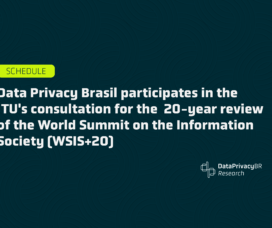
Data Privacy Brasil participates in the ITU’s consultation for the 20-year review of the World Summit on the Information Society (WSIS+20)
The 20-year review of the World Summit on the Information Society (WSIS+20) represents a major milestone for the field of digital governance in general and Internet governance in particular. In order to contribute to this process, Data Privacy Brasil submitted a response to this public consultation, which will be briefly discussed below.
-

Estão abertas as submissões de resumos para o T20 África do Sul
O Think20 South Africa convida pesquisadores de todo o mundo a contribuir para uma troca dinâmica de ideias sobre os desafios mais pertinentes da atualidade. O prazo para envio de resumos é até o dia 10 de fevereiro de 2025, às 19h (horário de Brasília).
-
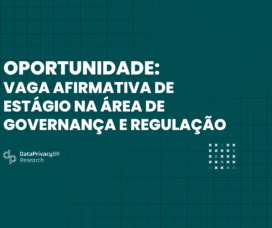
Inscrições encerradas – Vaga afirmativa de estágio na área de Governança e Regulação
A Data Privacy Brasil torna público o processo seletivo para contratação de estagiário(a) para compor o time de Governança e Regulação. Este processo seletivo destina-se exclusivamente a pessoas não-brancas.
-

G20: balanço de 2024 e perspectivas para 2025 para justiça e governança de dados
Em 2024 a Data Privacy Brasil assumiu um novo e empolgante desafio: participar do ecossistema do G20, durante a presidência brasileira, através do grupo de engajamento oficial para think tanks, o Think 20 (T20). Confira o texto para saber mais sobre a atuação da Data no G20.
Veja Também
-

20 anos do Fórum de Governança da Internet
Entre os dias 23 e 27 de junho, a Data Privacy Brasil esteve presente na vigésima edição do Fórum de Governança da Internet global - IGF, que aconteceu na cidade de Lillestrom, na Noruega. O Fórum tem sido o principal lugar de discussão sobre uso e desenvolvimento da Internet, destacando-se pelo formato multissetorial (multistakeholder).
-

Data Privacy Brasil contribui para formulação de evento de alto nível da Cúpula Mundial para a Sociedade da Informação
O evento, que é co-organizado pela UIT, UNESCO, PNUD, e UNCTAD, acontece em julho, e neste mês de março os stakeholders puderam enviar suas sugestões acerca do formato e do conteúdo a ser debatido, em especial à luz do processo de revisão.
-

Global South Alliance apresenta biblioteca digital e abre inscrições para associados
Para fortalecer ainda mais a Aliança, a GSA convida organizações a expressarem seu interesse em ingressar na rede preenchendo o formulário de inscrição disponível até 24 de abril de 2025.
-

Data Privacy Brasil participates in the ITU’s consultation for the 20-year review of the World Summit on the Information Society (WSIS+20)
The 20-year review of the World Summit on the Information Society (WSIS+20) represents a major milestone for the field of digital governance in general and Internet governance in particular. In order to contribute to this process, Data Privacy Brasil submitted a response to this public consultation, which will be briefly discussed below.
-

Estão abertas as submissões de resumos para o T20 África do Sul
O Think20 South Africa convida pesquisadores de todo o mundo a contribuir para uma troca dinâmica de ideias sobre os desafios mais pertinentes da atualidade. O prazo para envio de resumos é até o dia 10 de fevereiro de 2025, às 19h (horário de Brasília).
-

Inscrições encerradas – Vaga afirmativa de estágio na área de Governança e Regulação
A Data Privacy Brasil torna público o processo seletivo para contratação de estagiário(a) para compor o time de Governança e Regulação. Este processo seletivo destina-se exclusivamente a pessoas não-brancas.
-

G20: balanço de 2024 e perspectivas para 2025 para justiça e governança de dados
Em 2024 a Data Privacy Brasil assumiu um novo e empolgante desafio: participar do ecossistema do G20, durante a presidência brasileira, através do grupo de engajamento oficial para think tanks, o Think 20 (T20). Confira o texto para saber mais sobre a atuação da Data no G20.
-

Exploring Opportunities in the Digital Economy and AI at the G20
The task force 5 of T20 Brasil has engaged several international think tanks to provide ideas and policy proposals on crucial areas of technological development, such as AI and Digital Public Infrastructures. This includes encouraging G20 nations to adopt policies that protect individual rights while fostering innovation.
-
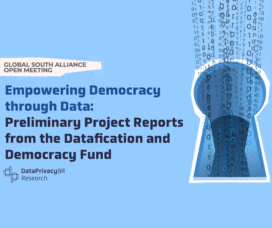
Empowering Democracy through Data: preliminary project reports from the DDF
The Global South Alliance wil host its next open meeting on October 22, 2024, where grantees from the first cohort of the Datafication and Democracy Fund (DDF) will present their impactful research.
-
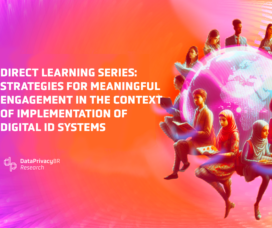
DIRECT Learning Series: strategies for meaningful engagement in the context of implementation of Digital ID systems
This workshop took place on August 28th, 2024, in the context of the Data Rights and Enforcement through Community Trust (DIRECT) Learning Series, an ongoing thematic series of workshops with members of the DIRECT consortium, supported by Internews.
-
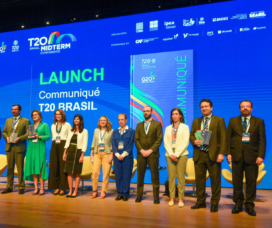
Data Privacy Brasil participa da Midterm Conference do T20
Nos dias 2 e 3 de julho, aconteceu no Rio de Janeiro a Midterm Conference, evento do T20 que contou com a participação de líderes de think tanks nacionais e internacionais, membros da academia, representantes dos setores privado e público e da sociedade civil para discutir e propor soluções para os principais desafios globais. Confira como foi a participação de Bruno Bioni, codiretor da Data Privacy Brasil no evento.
-

Grupos de engajamento do G20 emitem declaração conjunta sobre inteligência artificial
Entre os principais pontos da declaração estão: trabalho decente, inclusão significativa e justiça climática e social.
-

Documento da sociedade civil defende inovações tecnológicas para transformações sociais
Na segunda-feira (09), aconteceu em Máceio o evento "Transformação digital como catalisadora de avanços sociais", organizado pela Confederação Nacional da Indústria. O pesquisador da Data, Nathan Paschoalini, esteve presente como representante do T20, confira a sua participação no texto.
-

Horizontes Comuns: Identidade digital como parte de uma infraestrutura pública
A Data Privacy Brasil organizou um evento paralelo ao T20 sobre infraestrutura pública digital (IPD) e suas aplicações setoriais no dia 30 de julho na Dataprev, em Brasília. O evento foi um espaço de muito aprendizado e troca entre os participantes a respeito dos temas do evento, como IPD, digitalização, acesso a direitos pelo digital, identidade, justiça climática e avanços nos serviços financeiros.
-
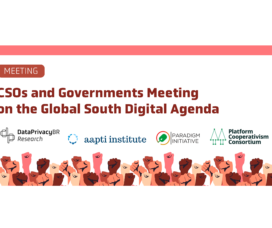
CSOs and Governments Meeting on the Global South Digital Agenda
On September 21st and 24th, the event “Open Dialogue: Global South Alliance and Governments for an Inclusive Digital Agenda” will take place, promoted by the organizations Data Privacy Brasil, Aapti Institute, Paradigm Initiative and PCC (The New School). The event aims to provide an open conversation with diplomats about the international agenda for IPRs, AI, GDC implementation and G20 continuity.
-
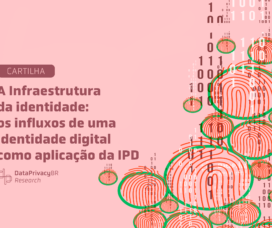
A Infraestrutura da identidade: os influxos de uma identidade digital como aplicação da IPD
Elaborada pela Data Privacy Brasil, com apoio da Ripple, a cartilha tem o objetivo de ampliar as discussões acerca a infraestrutura pública digital no Brasil e lançar luz aos principais pontos-chave da discussão
-
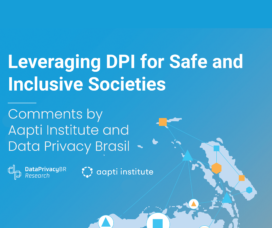
Leveraging DPI for Safe and Inclusive Societies
Aapti and Data Privacy Brasil have submitted their contribution to the Office of the United Nations Secretary-General's Envoy on Technology (OSET) and the United Nations Development Programme (UNDP) regarding the report "Leveraging DPI for Safe and Inclusive Societies".
-
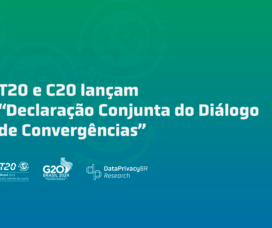
T20 e C20 lançam “Declaração Conjunta do Diálogo de Convergências”
Nos dias 2 e 3 de julho, aconteceu no Rio de Janeiro a Mid-Term Conference, evento do T20 que contou com a participação de líderes de think tanks nacionais e internacionais, membros da academia, representantes dos setores privado e público e da sociedade civil para discutir e propor soluções para os principais desafios globais.
-

Transformação Digital Inclusiva: confira a declaração com recomendações ao G20
No documento, foram definidas seis prioridades para lidar com questões como Inclusão digital e conectividade universal significativa; e desafios, oportunidades e governança da Inteligência Artificial.
-
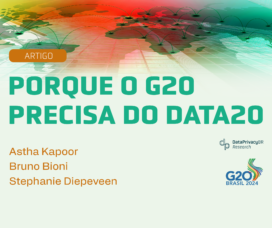
Porque o G20 precisa do Data20
A sociedade civil global discute a inclusão do Data20 entre os grupos de engajamento do fórum para impulsionar o debate, que já é prioridade no grupo de trabalho de Economia Digital. Confira no artigo de Astha Kapoor (Co-fundadora do Aapti Institute, da India), Bruno Bioni (diretor-executivo da Data Privacy Brasil) e Stephanie Diepeveen (pesquisadora associada na Universidade de Cambridge).
-

Datafication and Democracy Fund welcomes five organizations from the Global South for short-term projects
The Datafication and Democracy Fund Committee, composed of Data Privacy Brasil, Paradigm Initiative, and Aapti Institute, is pleased to announce the five organizations awarded funding for a short-term research project.
-

Position on the Global Digital Compact and the Summit of the Future
Between the 9th and 10th of May, the UN Civil Society Conference is happening in Nairobi. The event is presented as an opportunity to engage civil society in preliminary discussions ahead of the Summit of the Future.
-

Data Privacy Brasil e Aliança do Sul Global participam do NETmundial+10
Entre os dias 29 e 30 de abril foi realizado em São Paulo o NETmundial+10. Retomando o evento e a declaração NETmundial de 2014, esse evento teve como foco o fortalecimento da governança global multissetorial para a Internet e tecnologias digitais, assim como mensagens voltadas aos atores globais para melhor coordenação de diferentes processos em andamento.
-

Como construir uma identidade digital conjunta e inclusiva? Lançando as bases para uma ID cidadã
Você sabe o que é uma identidade? Pensando em facilitar o acesso ao tema, a Data Privacy Brasil desenvolveu uma série de conteúdos para dar as bases e as ferramentas necessárias a todos os interessados no assunto. Com isso, conseguiremos discutir, enquanto comunidade, o que queremos com uma identidade digital e como podemos chegar lá.
-

Data Privacy Brasil participa de evento inaugural do T20
Entre 4 e 6 de março, o Comitê Organizador do T20 Brasil - composto por CEBRI, FUNAG e IPEA - realizou o primeiro evento oficial do grupo de engajamento. O evento aconteceu de modo completamente virtual e teve transmissão aberta ao público.
-
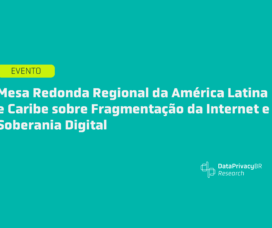
Mesa Redonda Regional da América Latina e Caribe sobre Fragmentação da Internet e Soberania Digital
A Data Privacy Brasil, com o apoio da Global Partners Digital, promove no dia 12 de março a mesa redonda “Latin American & Caribbean Regional Roundtable on Internet Fragmentation and Digital Sovereignty”.
-
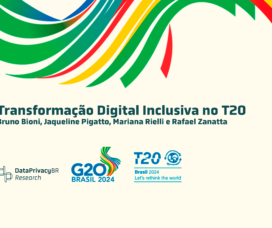
Transformação Digital Inclusiva no T20
O ano de 2024 marca a presidência do Brasil no G20, grupo das maiores economias do mundo, presidido por nós pela primeira vez. É um ano, portanto, de uma grande oportunidade para o país influenciar uma ampla agenda de governança global, priorizando temas como desigualdade, mudanças climáticas, e claro, as transformações digitais.
-

Data Privacy Brasil no T20: Transformação Digital Inclusiva
O Grupo dos 20, também denominado de G20, é um dos principais fóruns de cooperação econômica mundial, desempenhando um papel fundamental no enfrentamento de grandes questões socioeconômicas mundiais. O G20 é composto por 19 países e dois órgãos regionais (União Africana e União Europeia).
-

UNIDIR publica documento sobre fragmentação da Internet e cibersegurança
No dia 6 de dezembro, um primer sobre fragmentação da Internet e cibersegurança foi publicado através do Instituto das Nações Unidas para Pesquisa sobre o Desarmamento (UNIDIR). O documento surge como primeiro resultado de um estudo em duas partes sobre os tópicos em questão que vem sendo conduzido pelos pesquisadores do programa.
-
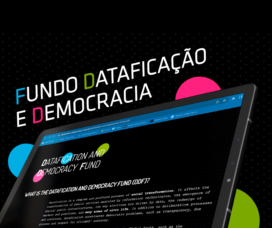
Data Privacy Brasil, Paradigm Initiative and Aapti Institute announce the launch of the “Datafication and Democracy Fund”
The fund aims to finance activities that strengthen the work of NGOs in the Global South on issues of datafication and democracy
-
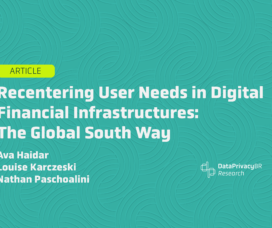
Recentering User Needs in Digital Financial Infrastructures: The Global South Way
Through India’s G20 leadership in 2023, global agendas of digital transformation and financial growth have come to be intimately reoriented to challenges, priorities and special developments in the Global South.
-

Na UNCTAD eWeek, painel da Data Privacy Brasil discutirá a intersecção entre economia digital e direitos humanos na regulação de IA
Entre os dias 4 e 8 de dezembro, acontecerá a primeira edição da UNCTAD eWeek, iniciativa da Conferência das Nações Unidas para o Comércio e Desenvolvimento (UNCTAD), com parceiros da eTrade for all.
-
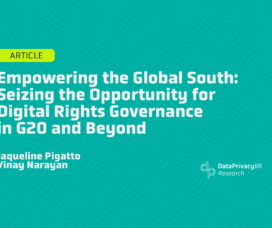
Empowering the Global South: Seizing the Opportunity for Digital Rights Governance in G20 and Beyond
The G20 represents a critical policy space for addressing emergent challenges on a global scale and its importance as a platform is pronounced when we consider its significance for the Global South.
-
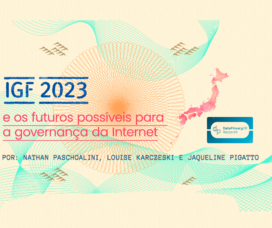
IGF 2023 e os futuros possíveis para a governança da Internet
Entre os dias 08 e 12 de outubro, a Data Privacy Brasil participou, presencialmente, do 18º Internet Governance Forum (IGF). A edição deste ano aconteceu em Quioto, no Japão, e reuniu diversos atores em debates sobre os principais temas que concernem a governança da Internet globalmente.
-

Pesquisa destaca o envolvimento do Sul Global na formulação de políticas para direitos digitais
A Associação Data Privacy Brasil de Pesquisa anuncia o lançamento de um relatório de pesquisa sobre as experiências e expectativas do Sul Global em engajamentos internacionais no campo de direitos digitais. O lançamento ocorreu durante a 18ª reunião anual do Internet Governance Forum (IGF), em Kyoto.
-

No Fórum Público da OMC, Data Privacy Brasil e REBRIP vão discutir a intersecção entre regulação de IA e compromissos de comércio digital envolvendo código fonte e algoritmos
O Fórum Público da OMC 2023 ocorrerá entre os dias 12 e 15 de setembro em Genebra.
-

Reportagem completa – Pecuária ilegal pode ser considerada uma das principais motivações para invasão e exploração de terras indígenas no Brasil
O país é um dos maiores produtores e exportadores de carne do mundo. O crescimento da pecuária bovina apresenta forte ligação com o cerceamento aos direitos dos povos tradicionais
-

Pecuária ilegal pode ser considerada uma das principais motivações para a invasão e exploração de terras indígenas no Brasil
Confira a reportagem resultado da bolsa de jornalismo ofertada pela Data Privacy Brasil de Pesquisa, como parte do projeto “Ambiente e informação: contestando a instrumentalização da política da LGPD na regulação ambiental”.
-

Data Privacy Brasil envia contribuição ao Comitê de Direitos Humanos da ONU
Em conjunto com Privacy International e InternetLab, a Associação destacou violações à proteção de dados de crianças e adolescentes no contexto escolar.
-

Vaga de Consultoria em Pesquisa com Crianças e Adolescentes
A Associação Data Privacy Brasil de Pesquisa torna público o edital com inscrições até o dia 07 de agosto de 2023.
-
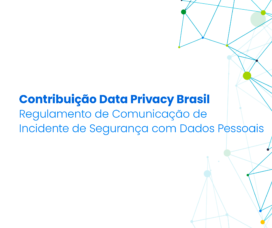
Contribuição | Regulamento de Comunicação de Incidente de Segurança com Dados Pessoais
Confira a contribuição da Associação Data Privacy Brasil de Pesquisa e Data Privacy Brasil Ensino a Tomada de Subsídios da Autoridade Nacional de Proteção de Dados.
-

A honra de quem desmata versus a proteção ambiental
Pesquisa realizada pela Associação Data Privacy Brasil de Pesquisa aponta como a LGPD tem sido utilizada para impedir o acesso a dados relacionados a questões ambientais.
-

Nota pública sobre apresentação do projeto de lei de Inteligência Artificial
Saiba mais sobre o posicionamento da Associação Data Privacy Brasil de Pesquisa em relação ao Projeto de Lei n° 2338/2023 apresentado no último dia 03 de maio pelo senador Rodrigo Pacheco.
-
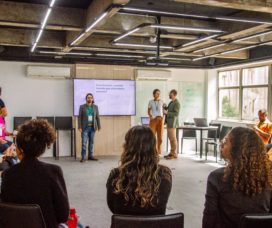
Associação Data Privacy Brasil de Pesquisa realiza evento “Dados pessoais e controle de políticas ambientais: caminhos para a transparência pública”
Evento realizado na sede do Data no âmbito do projeto "Ambiente e informação: contestando a instrumentalização política da LGPD na regulação ambiental", financiado pelo Instituto Clima e Sociedade (iCS).
-
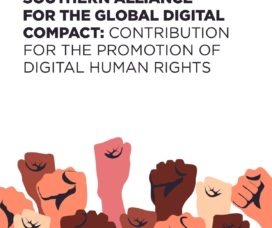
Southern Alliance for the Global Digital Compact
Atendendo ao chamado realizado pela Organização das Nações Unidas, a Associação Data Privacy Brasil de Pesquisa em conjunto com organizações do Sul Global apresenta contribuição ao Pacto Global Digital.
-

Associação Data Privacy Brasil de Pesquisa envia contribuição para ONU na chamada sobre novas tecnologias
Recebemos a chamada como uma oportunidade para enviar sugestões a fim de informar o relatório do OHCHR sobre a relação entre os direitos humanos e os processos de definição de padrões técnicos para novas e emergentes tecnologias digitais.
-

Associação Data Privacy Brasil participa do grupo de engajamento da sociedade civil do G20
Veja como a Associação Data Privacy Brasil de Pesquisa tem buscado se engajar com o C20, tanto para conhecer mais das propostas que estão sendo trazidas ao grupo em nível internacional, quanto para contribuir com pesquisas e advocacy que temos realizado no Brasil recentemente.
-
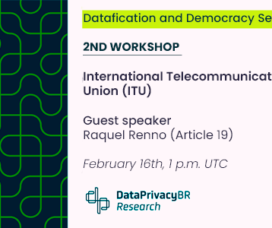
União Internacional de Telecomunicações – Relatório do segundo workshop da série Datafication and Democracy
In the second meeting of the Datafication and Democracy Workshop Series, we received Raquel Renno, Digital Programme Officer of Article 19, who spoke about the International Telecommunication Union (ITU) for third sector organizations.
-
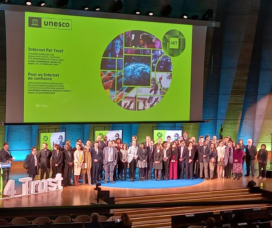
Brasil busca retomada do protagonismo na governança da Internet em evento da UNESCO
Leia o relato das representantes da Associação Data Privacy Brasil de Pesquisa, que fizeram parte da delegação brasileira no Internet for Trust.
-

Associação Data Privacy Brasil de Pesquisa participa da Reunião Ministerial da OCDE sobre economia digital
Evento teve como principal tema de debate os caminhos para um futuro inclusivo no ambiente virtual
-

Vamos ficar de olho no Pacto Global Digital
O que é o Pacto Global Digital e por quê é importante ficar atento a ele?
-

Why should we all pay attention to the Brazilian Digital ID system?
The implementation of digital identity systems is increasing around the world, especially in Global Southern countries. The model widely adopted is known as Big ID, promoted by or linked to public administration bodies which use centralized biometric databases to identify and authenticate citizens (Access Now, 2021).
-

Associação Data Privacy Brasil de Pesquisa lança edital de bolsas de Tecnoinvestigação em parceira com o The Intercept Brasil
Projeto, feito em conjunto com Conectas e Data Labe, selecionou quatro bolsistas para realizar a produção de reportagens sobre Tecnoautoritarismo
-

A LGPD no Congresso após 4 anos de promulgação de 2 anos de vigência
Surgimento da lei e a modificação do contexto brasileiro de proteção de dados foram acompanhados de perto pela Associação Data Privacy Brasil de Pesquisa
-
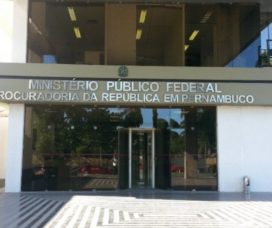
Degustação de dados pessoais de cidadãos brasileiros por bancos na mira do Ministério Público Federal
Após recurso apresentado pela Coalizão Direitos na Rede, “degustação experimental” de dados pessoais por associações bancárias será investigada
-

Cooperação internacional em proteção de dados: conhecendo a Rede Iberoamericana de Proteção de Dados e seu Fórum da Sociedade Civil
Organização busca estabelecer o desenvolvimento de uma agenda sólida de proteção de direitos digitais no Sul Global
-

13º Seminário de Proteção à Privacidade e aos Dados Pessoais
Painel sobre pesquisa “Privacidade e proteção de dados pessoais 2021” (CETIC)
-

Data Privacy Brasil submete contribuição à tomada de subsídios da Autoridade Nacional de Proteção de Dados sobre transferência internacional de dados
Colaboração busca contribuir com o desenvolvimento do debate acerca do tema
-
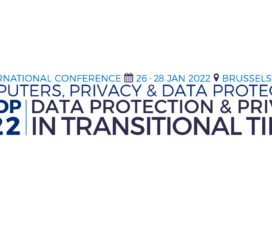
Data Privacy Brasil participa da CPDP 2022
Evento reuniu especialistas de todo o mundo para debater os atuais desafios do campo da privacidade e da proteção de dados
-
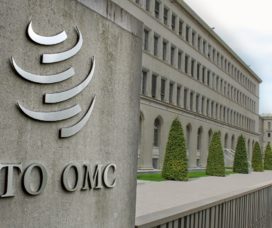
Organização Mundial do Comércio realiza a sua 12ª Conferência Ministerial
A cobertura do evento, dedicado a acordos e negociações envolvendo comércio internacional, foi acompanhada pela Associação Data Privacy Brasil de Pesquisa.
-

Alguns significados do anúncio do Global CBPR Forum para a agenda de dados e comércio
Estabelecimento do Fórum busca unir abordagens regulatórias e estabelecer um sistema de certificação para empresas que desejam demonstrar conformidade com os regulamentos de proteção de dados em todo o mundo
-
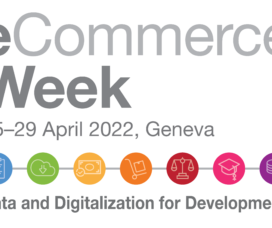
Interface entre dados e comércio foi tema central da UNCTAD e-commerce week 2022
Evento buscou colocar em pauta os principais debates sobre direitos digitais, comércio internacional e desenvolvimento global
-

Data Privacy Brasil participa do webinário “Microdados educacionais e a LGPD: Impactos e aspectos legais”
Evento buscou abordar as mudanças realizadas pelo INEP na divulgação de metadados
-

PL 454/22: Assim como a transparência na educação, proteção de dados de crianças e adolescentes também é prioridade absoluta
Coalizão Direitos nas Redes destaca que discussão em torno dos direitos digitais de crianças e adolescentes deve ser realizada de maneira técnica pelas autoridades e com participação da sociedade civil
-

Álbuns de suspeitos e a regulação do ciclo de vida dos dados
Prática de reconhecimento de possíveis criminosos utilizada em delegacias brasileiras viola o direito constitucional à intimidade
-
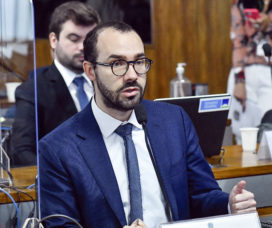
Comissão de juristas responsável pela criação do projeto de regulação da Inteligência Artificial no Brasil é instalada no Senado
Grupo de especialistas tem prazo de 120 dias para apresentar proposta ao Congresso Nacional
-
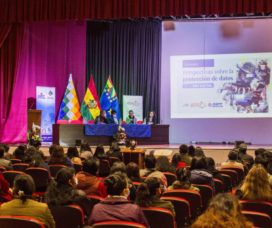
Ativistas latino-americanos fazem balanço sobre proteção de dados pessoais na Bolívia
Evento realizado na Bolívia foi guiado pelo contexto cada vez mais datificado da América do Sul
-
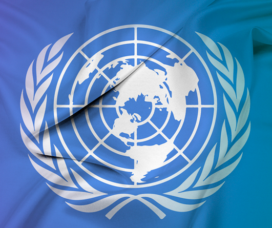
A Convenção de Crimes Cibernéticos da ONU e a guerra entre Rússia e Ucrânia
Inicio das atividades do Comitê de Convenção de Cibercrimes da ONU é marcado pelo clima diplomático instável
-

Nova Carteira de Identidade Nacional é apresentada pelo Governo Federal
Lançamento do documento esbarra na iniciativa do TSE, iniciada em 2017, de implementar o Documento Nacional de Identificação (DNI)
-
Comitê da ONU inicia discussões para Convenção Internacional de Crimes Cibernéticos #UNCyberCrime
Os debates que serão realizados pela comissão procuram um caminho para facilitar a cooperação internacional no combate a crimes na internet
-

Associação Data Privacy Brasil participa do evento Critical Juncture For Global Privacy: EU, Asia and Beyond
Encontro abordou os diferentes caminhos de elaboração e execução das leis de proteção de dados
-
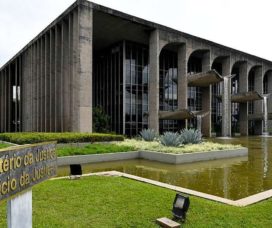
Data Privacy Brasil solicita ao MPF investigação sobre sistema de vigilância utilizado pelo governo federal
Representação elaborada em conjunto com Conectas, Transparência Internacional e Artigo 19 demanda averiguação da atuação do Ministério da Justiça
-
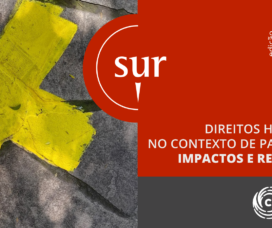
Conectas e Data Privacy Brasil lançam a 31° edição da Revista Sur
Publicação proporciona debates a respeito dos impactos da pandemia sobre os direitos coletivos e liberdades individuais no Sul Global
-

Associação Data Privacy brasil de pesquisa é finalista da 3° edição do prêmio Livre.Jor
Relatório elaborado por meio da plataforma Dados Virais foi indicado na categoria Rastilho
-

Mais de 100 organizações pedem participação e inclusão em Comitê sobre cibercrimes da ONU
Documento enviado à ONU busca combater o uso de tecnologias com finalidades criminosas e garantir direitos digitais a todas as pessoas
-

Insegurança informacional no Ministério da Saúde e a proteção de dados pessoais
Ataque hacker sofrido pelo Ministério, que comprometeu diversos sistemas da pasta incluindo a emissão do Certificado Nacional de Vacinação da COVID-19, escancara insegurança informacional dos órgãos públicos brasileiros
-

Data Privacy organiza painel sobre tecnoautoritarismo no Fórum de Governança da Internet
Conferência buscou debater a ascensão de práticas autoritárias por meio da tecnologia
-

Decifrando a mensagem do caso Whatsapp enviado pelo grupo de autoridades brasileiras
Nova política de privacidade do whatsapp gera reação conjunta de órgãos públicos.
-

Data Privacy participa de audiência pública sobre crimes cibernéticos e proteção de dados
Seminário virtual buscou debater o papel do legislativo brasileiro no combate a crimes virtuais.
-

12° Seminário de Privacidade e Proteção de Dados do CGI.br: um balanço da LGPD e olhares prospectivos a partir da lógica multissetorial
12° Seminário de Privacidade e Proteção aos Dados Pessoais do CGI.br traz balanço da LGPD e olhares para o futuro
-

Data Privacy participa de painel sobre futuro da economia digital cooperativa
Evento internacional debate cooperativismo de plataforma no mundo digital.
-

Data Privacy participa do evento China In The World Summit
Evento internacional discute influência chinesa por meio de pesquisas.
-
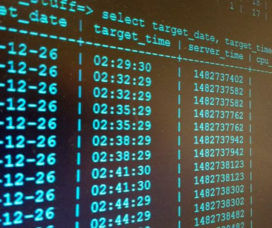
LGPD faz três anos e debate sobre privacidade e proteção de dados no Congresso não tem hora para acabar
A PEC 17/2019, que dentre outras coisas torna a proteção de dados pessoais um direito fundamental explicitamente reconhecido pela Constituição Federal, está na pauta do Plenário da Câmara dos Deputados. Aprovado há mais de um ano na Comissão Especial destinada a analisar a PEC, o parecer na forma de substitutivo do relator, deputado Orlando Silva, também envolve […]
-

LGPD e sistema de justiça: a voz e a vez das Defensorias Públicas
* Texto originalmente publicado no site Jota, este artigo contempla alguns dos principais achados do Guia de Primeiros Passos para a Adequação das Defensorias à LGPD, documento produzido pela Associação Data Privacy Brasil após mais de um ano do projeto Defensorias Públicas e Proteção de Dados Pessoais. Desde sua entrada em vigor em setembro de 2020, a LGPD tem […]
-

Levando os metadados a sério
No artigo “Vigilância em massa ou combate à desinformação: o dilema do rastreamento“, publicado no Conjur em 04 de agosto, Juliana Abrusio, Ricardo Campos, Matthias Kettemann e Florian Wittner apresentam uma defesa do polêmico artigo 10 do PL 2630/2020. Trata-se do artigo que prevê a rastreabilidade das mensagens de grupos de Whatsapp e Telegram, desde […]
DataPrivacyBr Research | Conteúdo sob licenciamento CC BY-SA 4.0

